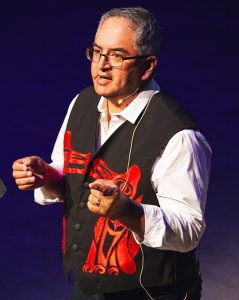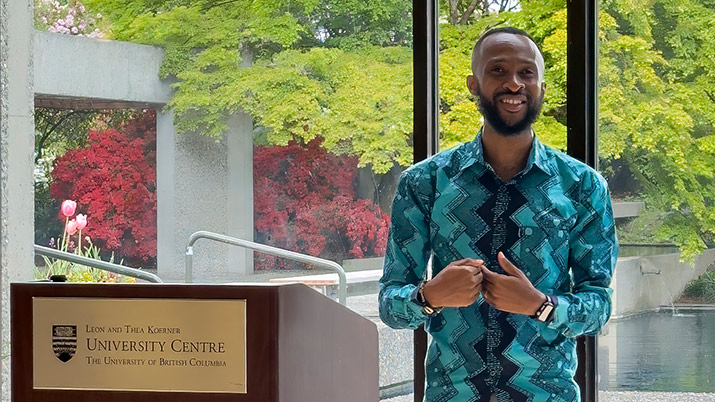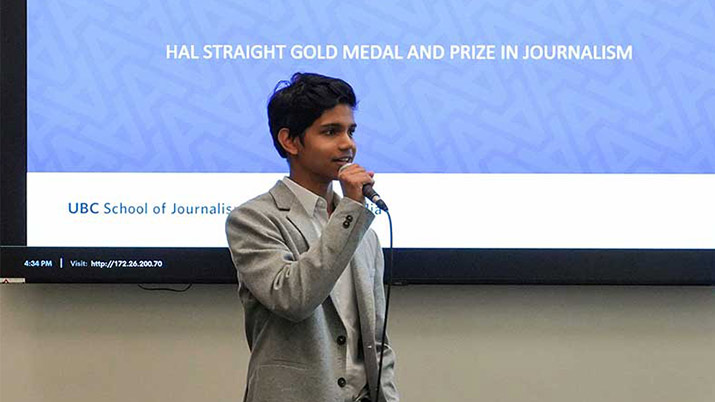Wawmeesh Hamilton graduated from UBC Journalism in 2016 and currently works as a reporter with The Discourse in Vancouver. He was instrumental in the 2018 “Reconciliation in small towns” series, co-produced by The Discourse and CBC Indigenous and nominated for a Jack Webster Award for excellence in digital journalism.


Photo courtesy of RavenSPEAK Amplified
Hamilton’s work has also been published by CBC, The Canadian Press, The Globe and Mail, Star Metro Vancouver and The Tyee. He worked as a reporter and photographer for the Alberni Valley News for more than seven years and is a member of the Hupacasath First Nation in Port Alberni, B.C.
Here’s what Hamilton had to say about his time at UBC Journalism and beyond:
What led you to choose UBC Journalism as a mid-career journalist?
I earned a journalism certification at Langara College in 2006. From 2007 to mid-2014 I worked at the Alberni Valley News as a reporter/photographer, and that was within the small town context. With few resources, you work harder than even larger publications do. You have to be more resourceful in terms of digging up stories and reporting them by deadline. That being said, in 2013, I took a break. I did a project for Journalists for Human Rights that covered Indigenous projects across the country that were benefiting Indigenous youth. So I took a summer off and I went across the country.
Three things came out of that. I saw a journalism world outside of my small town. You work in a small town long enough and your view becomes parochial. You don’t see outside of where you work. The other thing I saw was a growing interest in Indigenous issues, people and communities. There was this curiousness about Indigeneity and Indigenous people. Indigenous issues had been part of my beat where I’d worked previously, but they weren’t my beat solely. I was responsible for every beat. I would do Indigenous stories from time to time.
The third thing, probably the most important thing that came out of that JHR experience is my editor was David Beers. On my way back through Vancouver, we would debrief and talk about the world of journalism and journalism as it relates to Indigenous people. That opened up another world. What I saw traveling opened up my vistas. Speaking to Dave opened my curiosity professionally and educationally. Each time we talked I was left with a little nugget.
I went back to work in September 2013 and Dave asked me to speak to his Feature Writing class. When I returned to Alberni, I used to keep a storyboard beside my desk that had pictures of conflict from around the world … the Arab spring had just happened earlier and I used to look at that board all the time to remind myself there was a world outside of where I worked, and I should pay attention. My editor and I were having a discussion about a story and she stopped talking. She looked at me and said, “I need your mind right here,” pointing at my community story. “Not out there,” pointing at my story board. And I knew it was time to leave. I’d outgrown there. But at the same time thought to myself, “I want to know exactly what I can do in this business. I want to know exactly how far I can go. I want to challenge myself.”
What are some of the highlights and challenges of your time at UBC Journalism?
Learning how to tell stories using audio. It really intrigued me because you can capture things with audio that you just can’t with a written story. My internship was at CBC Manitoba at the end of our first year. I worked for current affairs and then CBC Indigenous — radio and web. Current affairs was both, CBC Indigenous was strictly web. And I also learned there is such a thing now as an online writing style. When I worked at Alberni Valley News, you just took your stories and you poured them onto the newspaper’s server. They were identical to the newspaper stories, there wasn’t a web style. So that was a bit of a challenge as well. A lead that grabs, two key points, and your best quote.
The other person I watched and listened to was Duncan McCue. I’ve had enough people ask me, “You were already a journalist, why did you go to UBC?” Some people ask me, “You’re Indigenous already, why take the Reporting in Indigenous Communities course?”
Because I want to learn. There’s not a hundred Duncan McCues out there that are teaching this kind of stuff that I can benefit from. I’ve never met anybody who wasn’t deeply touched by a story they did in that program, because of the time you spend in a community and the relationships you build with the people you’re reporting about. I will go as far as to say that Reporting in Indigenous Communities sets the standard for how reporting in Indigenous communities should be done to produce benefits — the kind of stories that do justice to Indigenous people, to issues that impact Indigenous people. It’s the gold standard for how that kind of reporting should be done.
In my second year, I worked predominantly on my own. I was doing a final research project and that was probably the greatest challenge even still, three years removed from the program. That still remains the toughest thing I’ve ever done and toughest subjects I’ve ever covered. I was taking on vicarious trauma. I was keeping really late hours. It was about the banishment and reintegration of Indigenous sex offenders from their First Nations communities.
Could you walk us through your path from graduating to your current role?
I had a second thesis idea to examine the status of press freedoms in B.C.’s modern day treaty First Nations communities … I tucked that idea in my back pocket. I wasn’t sure who I was going to pitch it to. When it came close to graduation, I met Erin Millar. She told me about Discourse, a startup. The year before, as a response to the Truth and Reconciliation calls to action, they had carved out space specifically for stories about reconciliation and issues that impact Indigenous people. She felt it most appropriate if an Indigenous journalist told stories in that space.
We talked a little more and I told her about my press freedom idea. She said, “That is a Discourse project. That needs time. That needs research. That’s multiple stories.” She said, “Look me up, once you graduate.” She got ahold of me before I graduated. We talked about my project and what they could offer, and that was the beginning of our relationship. I’ve been at Discourse ever since.
I talked to someone I worked with once, and she asked me “Do you really want to pigeonhole yourself just doing Indigenous stories?”
I said for almost eight years I worked as a journalist who happens to be Indigenous. I wrote about everything under the sun. So I’m specializing now. I’m 54 and I have a limited amount of time in this business. How best do I use it? This is what I choose. I’ve also got lived experience that gives me context that other reporters who aren’t Indigenous don’t have. It enables me to understand issues and how to express them, and understand things like putting in time to get a story.
What’s your advice for journalists thinking about coming to UBC Journalism?
Why do you want to do this? What does it mean to you? What do you hope to do? Is this for you? What reporters have you talked to, on what platforms, and gotten answers to questions like, “What is it like in this business?” After talking to them have you weighed whether you want to do this or not? What UBC graduates have you spoken to?
I’ve gotten a few calls, not necessarily about UBC. But an Indigenous kid who wants to be a journalist called me. I gave him the straight goods about this business, particularly about reporting on Indigenous issues and the tough go that some Indigenous journalists can have.
If you remember any one piece of advice, it’s to know why you want this, and remember it. If you’re very clear on why and you leave a little bit of room for it to grow and change a bit, that will be your life preserver. That will remind you why it’s worth it to stay up all hours or why, like me, you find yourself in the second floor lab at 3 A.M. I know why I was doing this and I still do.


